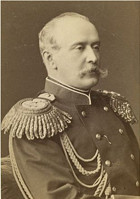
Birthday anniversary of Peter A. Shuvalov, Russian statesman and diplomat, General of Cavalry
15 (27) June 1827, in St. Petersburg, in the family of the chief Marshal of the court, was born Peter A. Shuvalov, Russian statesman and diplomat, Adjutant General, General of Cavalry, member of the State Council (1874).
Peter Shuvalov was educated in the Corps of Pages, graduating in 1845 at the rank of cornet. He began his service in the Guards Horse Regiment. Father's position favored the rapid and successful career of a young officer: in the following year he became a lieutenant, then a staff captain, and a captain.
At the outbreak of the Crimean War of 1853-1856 Peter Shuvalov commanded a squadron of Cavalry Regiment guarding the southern coast of the Baltic Sea. In the summer of 1854 Shuvalov entered the aides to the War Minister, Prince Dolgorukov. He took part in the defense of Sevastopol, for which was awarded the Order of St. Vladimir, 4th class with swords. In 1855 he became aide-de-camp, and in 1856 accompanied Count A. F. Orlov to Paris for the conclusion of a peace treaty.
In 1857, Shuvalov was appointed to the position of the Chief of Police and was promoted to the rank of major general. In 1860, Peter Shuvalov became Director of General Affairs of the Ministry of the Interior; from 1861 - the chief of staff of the gendarmerie, and manager of the third branch of His Imperial Majesty’s Own Chancery. In this role, his most celebrated cases were the elimination of student unrest in the capital and the first political trial - that of M. L. Mikhailov.
Three years later, in 1864, Shuvalov was promoted to lieutenant general and assigned the duties of Livland, Estland and Kurland Provinces’ governor-general and commander of the military district of Riga.
In 1866, Peter Shuvalov was Chief of Police and chief of the Division III. Shuvalov was a man of conservative views and a staunch opponent of the reforms of the 1860s. For about eight years he was the closest adviser to the emperor and was granted wide, almost dictatorial powers. Influence of Shuvalov was so significant that he was called a "vice-emperor" and "Peter IV». Later, the credibility of Alexander II decreased, and in 1874 he was appointed Ambassador Plenipotentiary to London.
In general diplomatic activity of Shuvalov, according to contemporaries, was unsuccessful. Exaggerating the danger of armed conflict with Britain and the possibility of a successful agreement with it, Shuvalov tried his best to delay the announcement of Russian-Turkish war, which allowed the Turks to arm themselves. 19 (31) March 1877, he signed with Lord Derby the protocol, under which Europe agreed to improve the plight of Turkish Christians. Despite this, three weeks later the war was declared. Assuring the Russian government that Britain decided by all means to fight, he helped the latter to ensure that Russia promised it not to transfer military operations in the eastern Mediterranean. This resulted in complete inaction of the Russian Baltic Fleet, the inability to blockade Constantinople and prevent Egypt from open support of Turkey.
When Russian troops crossed the Balkans and rushed to the walls of Constantinople, then, at the urging of Count Shuvalov, hostilities were suspended, giving full opportunity to the Austro-Hungarian Empire and Britain to prepare for war. In 1878, in fact, Shuvalov headed the Russian delegation at the Congress of Berlin. Concessions made there by Russian diplomats had negated all that was conquered by Russia in the Turkish war.
In 1884, Peter Shuvalov was appointed a member of the Special Commission for the drafting of local government. By the late 80's his participation in the meetings had become more symbolic. The Count spent most of the time at his estate.
Peter A. Shuvalov died 10 (22) March 1889.
Lit.: Виноградов В. Н. Британский лев на Босфоре. М., 1991; Долгоруков П. В. Петербургские очерки. М., 1992; Филиппова Т. А. П. А. Шувалов // Российские консерваторы. М., 1997.

